
2023-11-14
The 20th China Information Resources Management Forum and the Inaugural Meeting of the Autonomous Knowledge System Alliance for Information Resources Management Discipline in China, jointly hosted by the School of Information Resource Management at Renmin University of China, the Discipline Planning and Construction Office of Renmin University of China, and the Eighth Information Resources Management Discipline Evaluation Group of the Academic Degrees Committee of the State Council, were held in Beijing from October 20th to 21st, 2023. The forum’s theme was “Building on the Past, Embracing the New: The Mission and Future of Information Resources Management under the National Data Strategy.” The event attracted nearly 200 guests from universities, research institutions, government agencies, and enterprises.
1. Opening Ceremony
At 8:30 AM on October 20th, the forum was inaugurated with great solemnity. Prof. Yi Wang, member of the Party Committee and Vice President of Renmin University of China, and Prof. Huiling Feng, a national-first-level professor and Dean of the Research Center for Digital Humanities at Renmin University of China, delivered speeches. The opening ceremony was presided over by Prof. Yuenan Liu, Dean of the School of Information Resource Management at Renmin University of China.
Vice President Yi Wang extended a warm welcome to the attendees on behalf of the university. In her address, she highlighted that unprecedented changes in the world, the era, and history are unfolding in ways never seen before. There is an urgent need to address the questions China, the world, the people, and the era in the field of information resources management face. It is crucial to accelerate the construction of an independent knowledge system for information resources management in China. The establishment of the Autonomous Knowledge System Alliance for Information Resources Management Discipline in China holds great significance as a milestone. It is essential to focus on high-quality development in disciplinary construction, accelerate the establishment of an independent knowledge system for information resources management in China, revolve around China’s modernization process, advance theoretical research and practical development in information resources management simultaneously, leverage the role of the Information Resources Management Discipline Alliance, and realize the supportive role of the information resources management discipline in the national strategy.
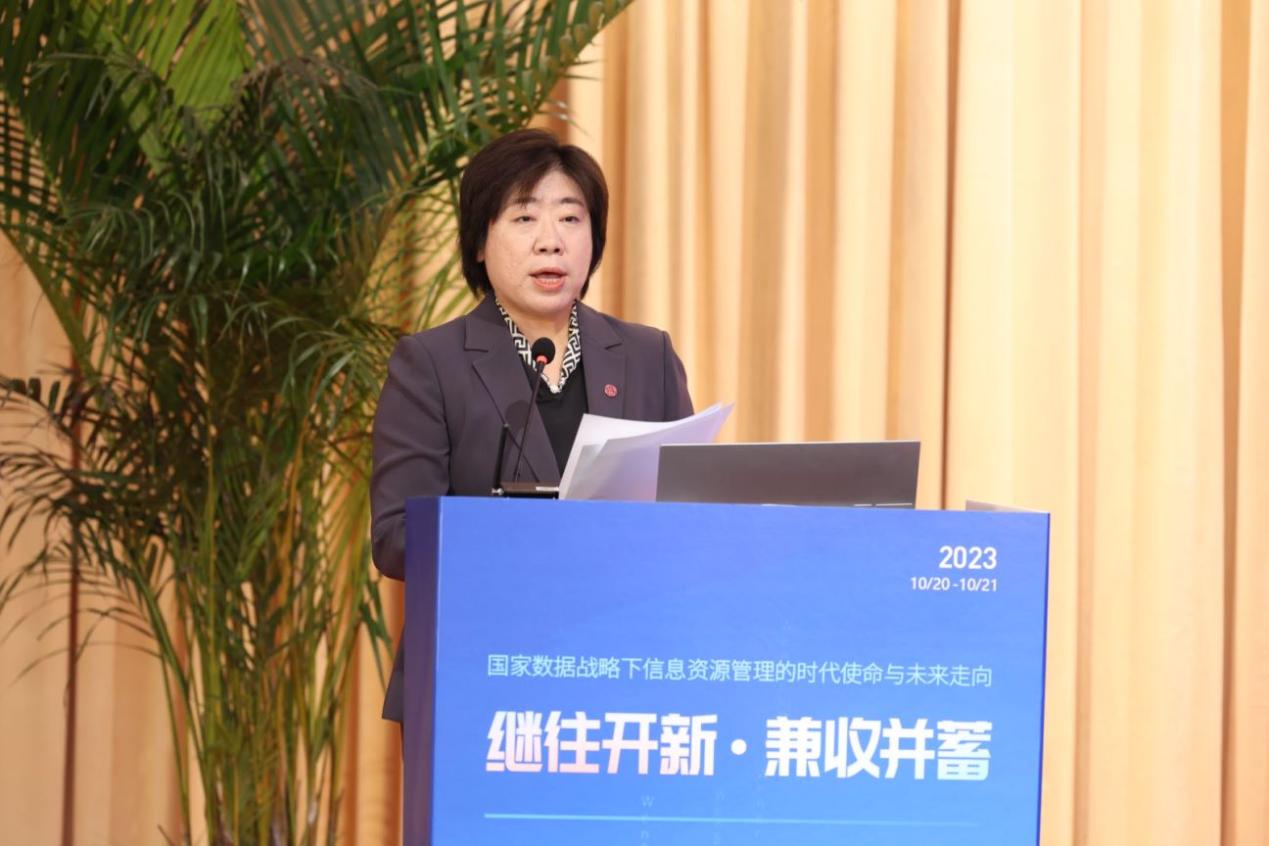
Prof. Huiling Feng pointed out that with the rise of the digital wave, we are currently in an era that is both the best and the most challenging. She emphasized the urgency of delving into the mission and direction of information resources management under the National Data Strategy. Additionally, she highlighted the country’s strategic needs for the discipline, focusing on three aspects: the demand for high-quality data, data theory, and data talent.

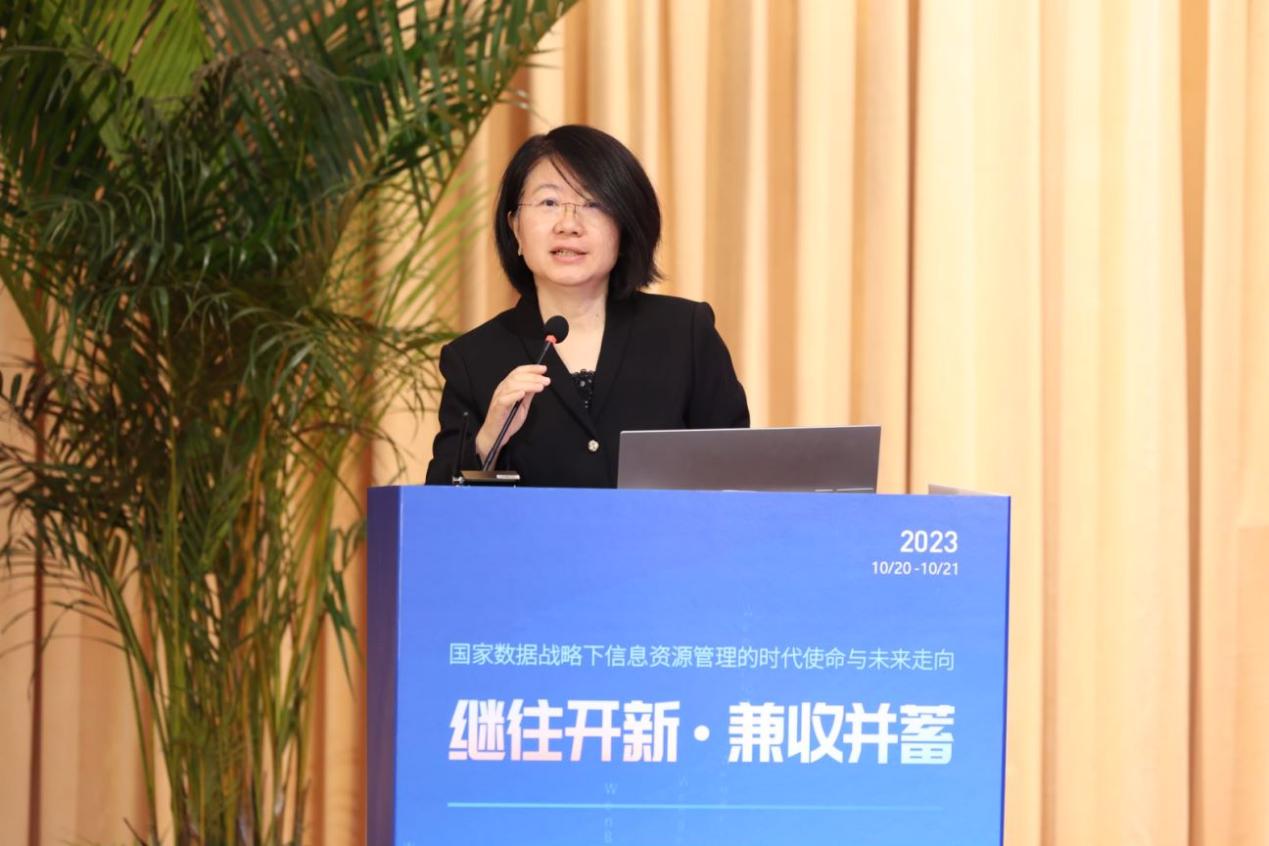
The attendees collectively watched the video short film titled “Saluting Twenty Years,” which reviewed the 20-year history of the Information Resources Management Forum. Following that, Prof. Minghui Qian, Associate Dean of the School of Information Resource Management at Renmin University of China, presented the “2023 China Cultural Digitization Innovation Index (CDI) Research Report.” Prof. Minghui Qian provided a detailed introduction to the research report, covering aspects such as research background, research methods, research findings, and policy insights. Associate Prof. Ming Ren, Associate Professor and Deputy Director of the Information Management and Analysis Department at the School of Information Resource Management, Renmin University of China, released the “Index of Market-Driven Advancement Force for Data Element (2023).” Associate Prof. Ming Ren explained the research background, index design, initial calculation conclusions, and progress of the report.

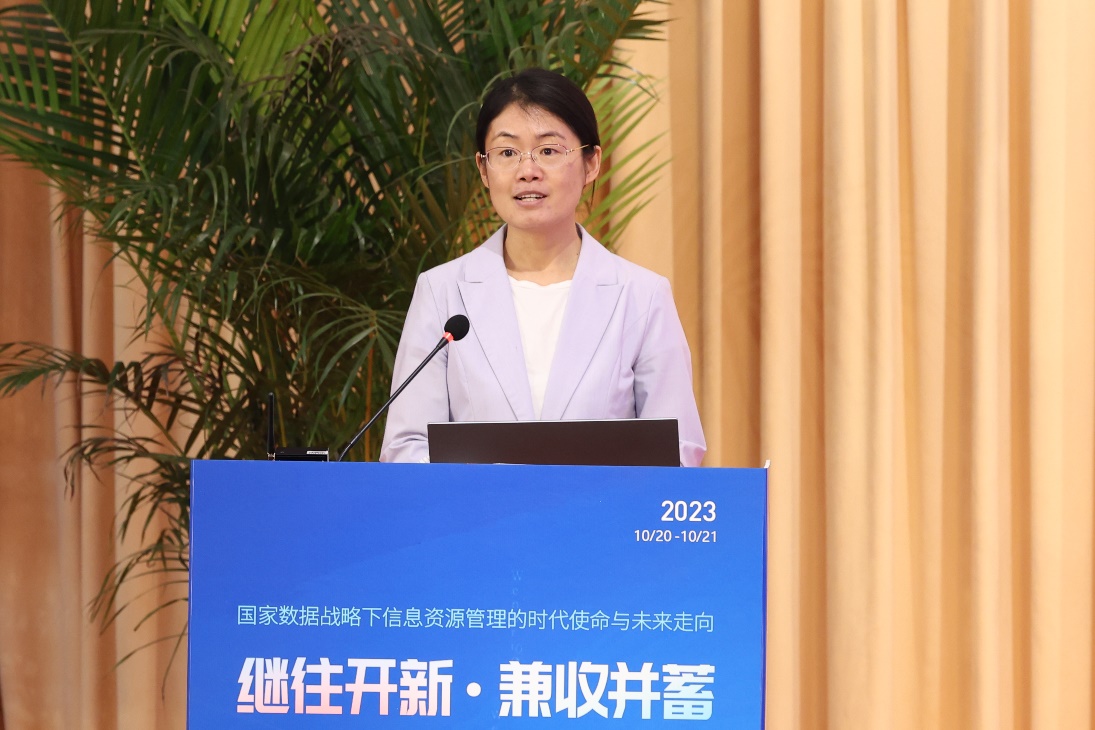
2. Inauguration Ceremony of the Autonomous Knowledge System Alliance for Information Resources Management Discipline in China
The inauguration ceremony of the Alliance was presided over by Prof. Yuenan Liu, Dean of the School of Information Resource Management at Renmin University of China. Representatives from 17 universities and three magazine/editorial offices attended the ceremony. Prof. Yi Wang, Vice President of Renmin University of China, national-first-level Professor Huiling Feng, Prof. Lixin Xia, Secretary of the Party Committee of Huazhong Normal University, Prof. Leye Yao, Vice President of Sichuan University, and Prof. Jianjun Sun, Convener of the Eighth Information Resources Management Discipline Evaluation Group of the State Council, jointly issued certificates to the Alliance as the co-sponsoring and initial member units.
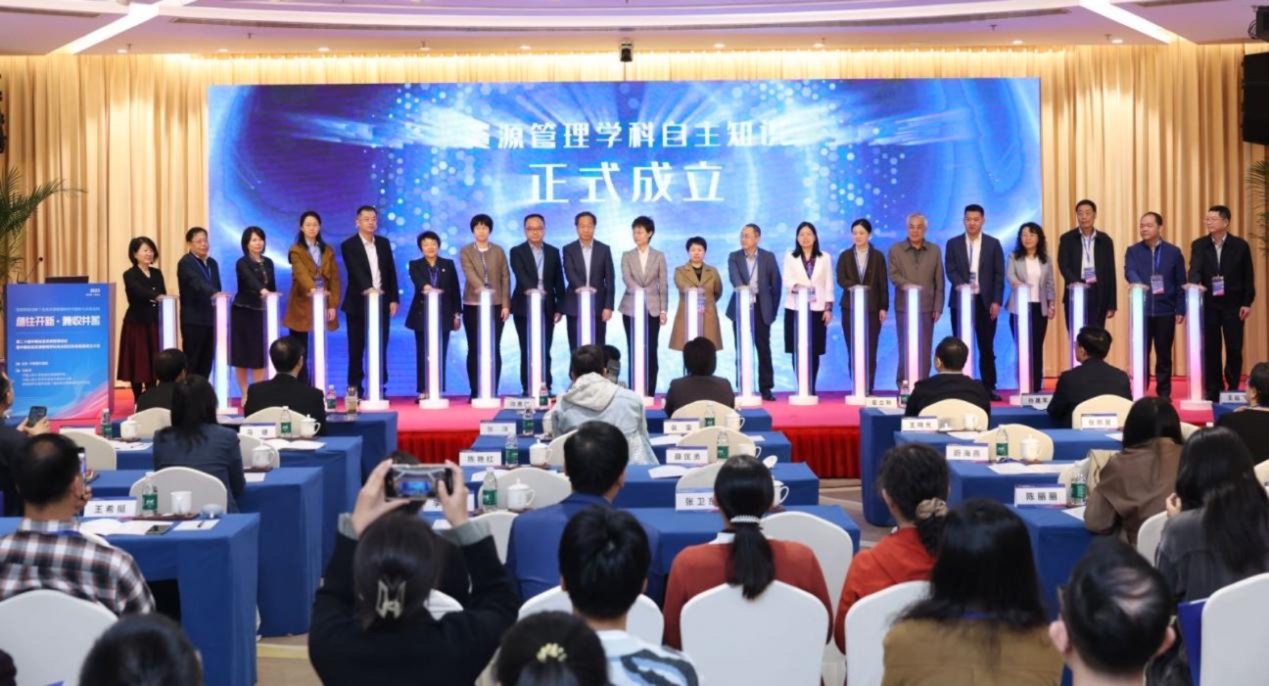
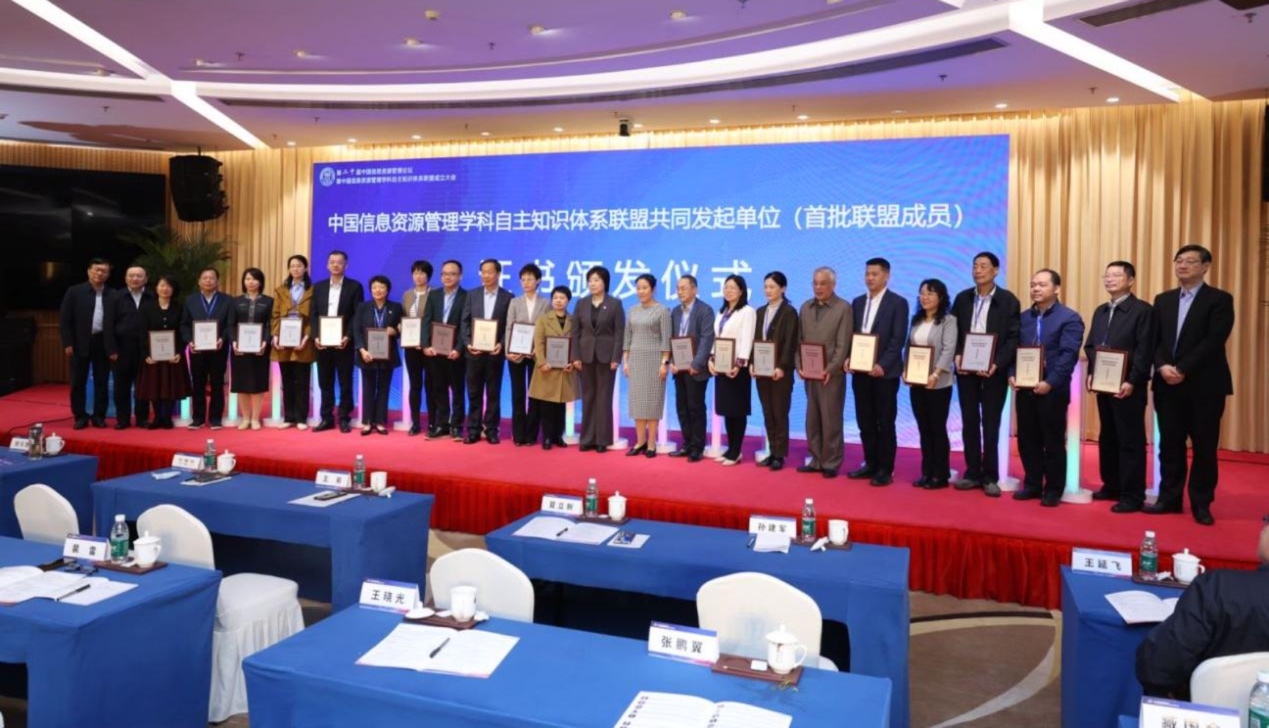
Prof. Jianjun Sun expressed gratitude to all the experts and scholars for their steadfast commitment to the initial aspirations of the discipline and their efforts and support for the establishment of the Alliance in his speech. He conveyed the expectation of building an open and standardized autonomous knowledge system and educational mechanism, accelerating the construction of the foundational theoretical framework of information resources management discipline, and inspiring the vitality of the younger generation of researchers. He also hoped to fully utilize the role of the Alliance to achieve widespread dissemination and application of excellent disciplinary achievements.
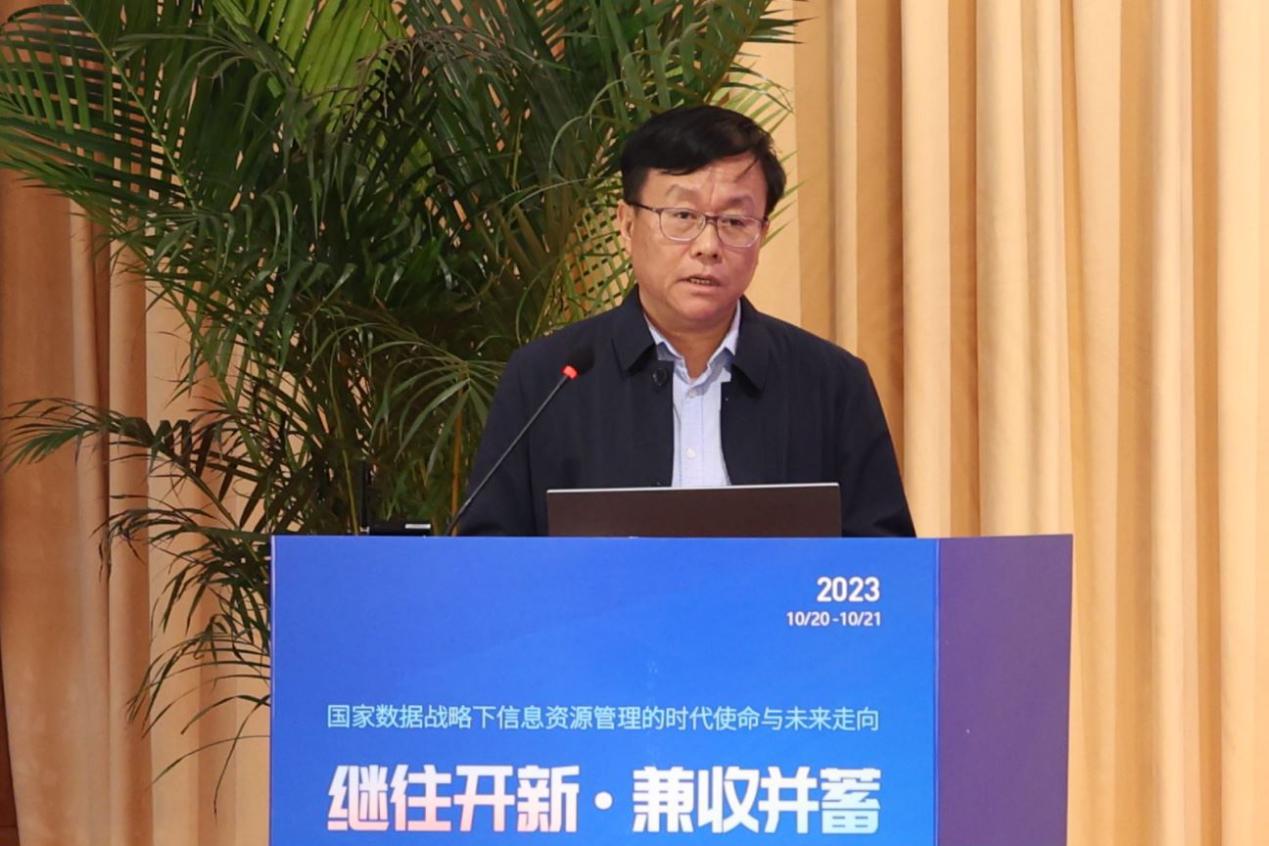
Prof. Lixin Xia pointed out in his speech that the establishment of the Alliance is of great significance for the construction of the discipline’s autonomous knowledge system. He emphasized the need to focus on problem orientation to promote knowledge innovation, strengthen basic research to facilitate theoretical innovation, and emphasize exchange and mutual learning to promote discourse innovation. These efforts aim to foster high-quality development in the field of information resources management.

In his address, Prof. Junxue Jia, Director of the Development Planning Office and the Discipline Planning and Construction Office at Renmin University of China, introduced a series of efforts undertaken by the university to actively implement the spirit of General Secretary Xi Jinping’s inspection and research speech. He emphasized that the Discipline Planning and Construction Office will continue to support the construction of the information resources management discipline and the establishment of its autonomous knowledge system.

Dean Yuenan Liu introduced the alliance’s charter and plans from four aspects: its mission, co-sponsoring units, collaboration scope, and operational mechanism, which received unanimous approval at the conference.
The following are the 20 co-sponsoring units and initial members of the Autonomous Knowledge System Alliance for Information Resources Management Discipline in China, listed in alphabetical order (Chinese) for universities and journals respectively:
Peking University, Department of Information Management
National Defense University, School of Political Science, Military Information, and Network Public Opinion
Hebei University, School of Management, Information Resources Management Discipline
East China Normal University, School of Economics and Management, Department of Information Management
Huazhong Normal University, School of Information Management
Jilin University, School of Business and Management, Department of Information Management
Nanjing University, School of Information Management
Nanjing Agricultural University, School of Information Management
Nankai University, Business School, Information Resources Management Department
Shanghai University, School of Cultural Heritage and Information Management
Sichuan University, School of Public Administration, Information Resources Management Discipline
Wuhan University, School of Information Management
Xiangtan University, School of Public Administration, Information Resources Management Discipline
Zhengzhou University, School of Information Management
University of Chinese Academy of Sciences, School of Economics and Management, Information Resources Management Department
Renmin University of China, School of Information Resource Management
Sun Yat-sen University, School of Information Management
3. Keynote Speeches
The keynote speeches were divided into two sessions. The first session was chaired by Prof. Yuelin Li, Director of the Department of Educational Affairs, Director of the Information Resources Management Department at the Business School, and Member of the Eighth Information Resources Management Discipline Evaluation Group of the State Council at Nankai University.

Prof. Leye Yao delivered a keynote speech titled “The Overall Architecture of the Smart Elderly Care Data Resource System for the Healthy China Strategy.” He elaborated on the construction of the smart elderly care data resource system, including research background, research design, application scenarios and services, system integration solutions architecture, and the overall framework of the smart elderly care resource system.
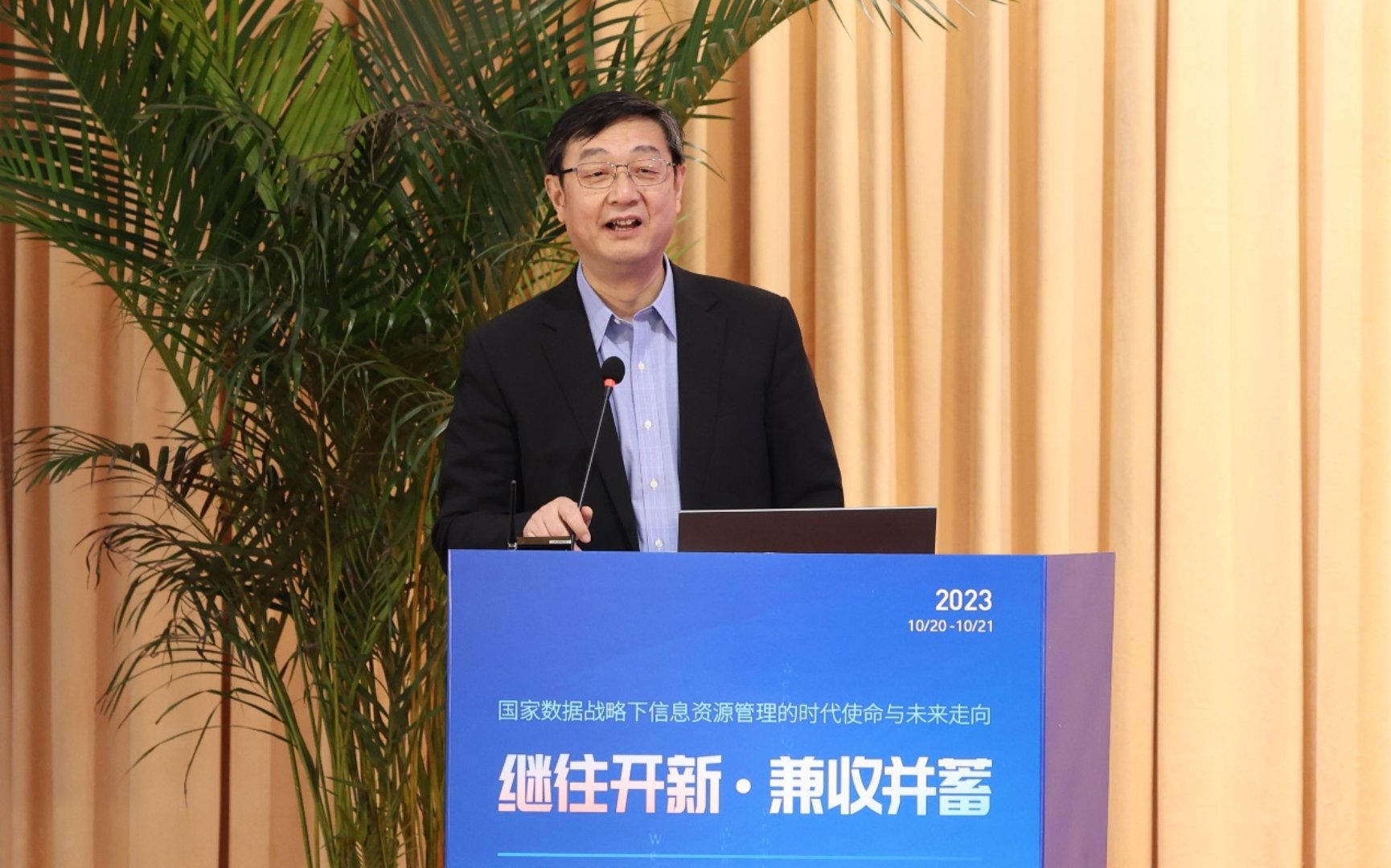
Prof. Jianjun Sun delivered a keynote speech titled “Research on Data Elements from the Perspective of Information Resources Management: New Fields and New Directions.” He first introduced the concept of data elements, conducted a detailed analysis of the relationship between data elements and the discipline of information resources management, and proposed nine research topics related to data elementization and the digital economy. Additionally, he shared ten insights on the future development of information resources management.
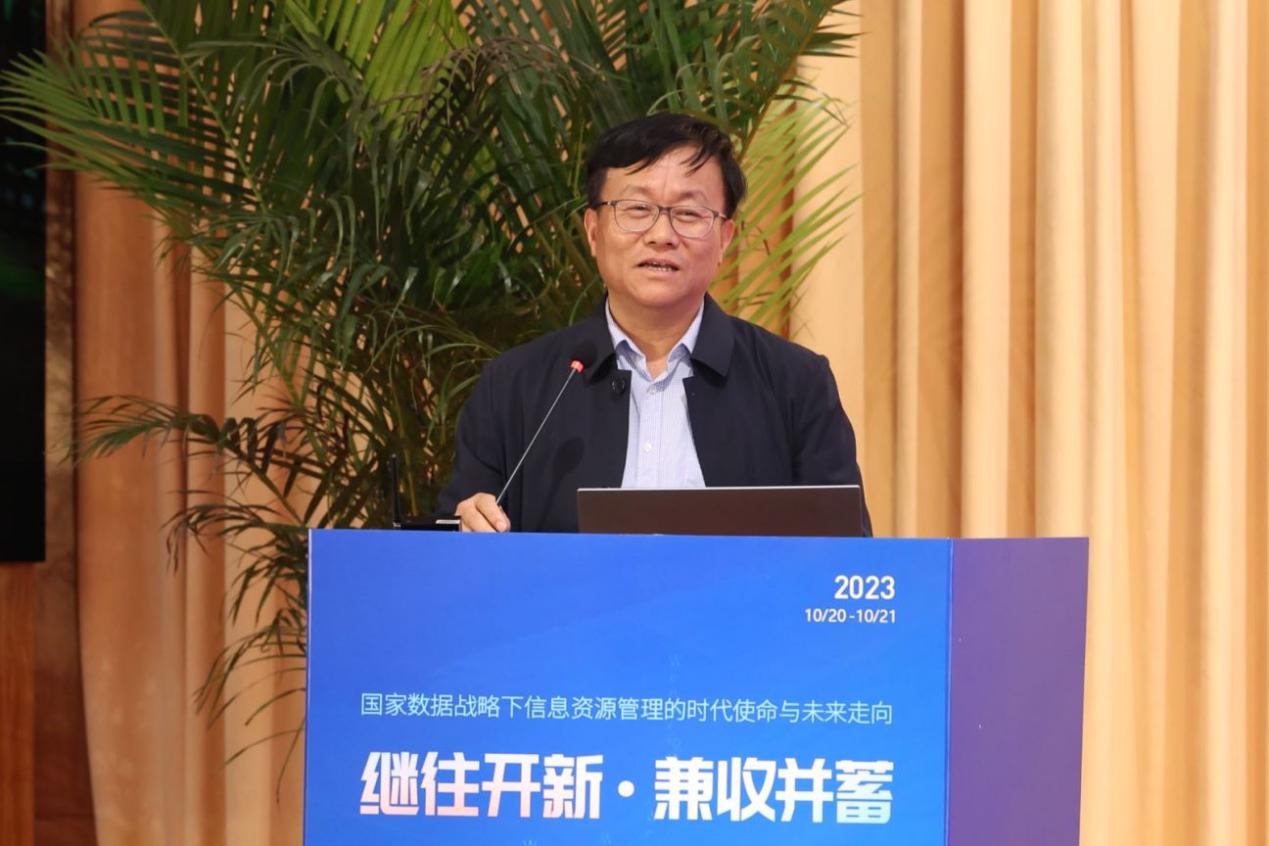
The second session of keynote speeches was chaired by Prof. Shuiqing Huang, leader of the Information Resources Management Discipline at Nanjing Agricultural University.
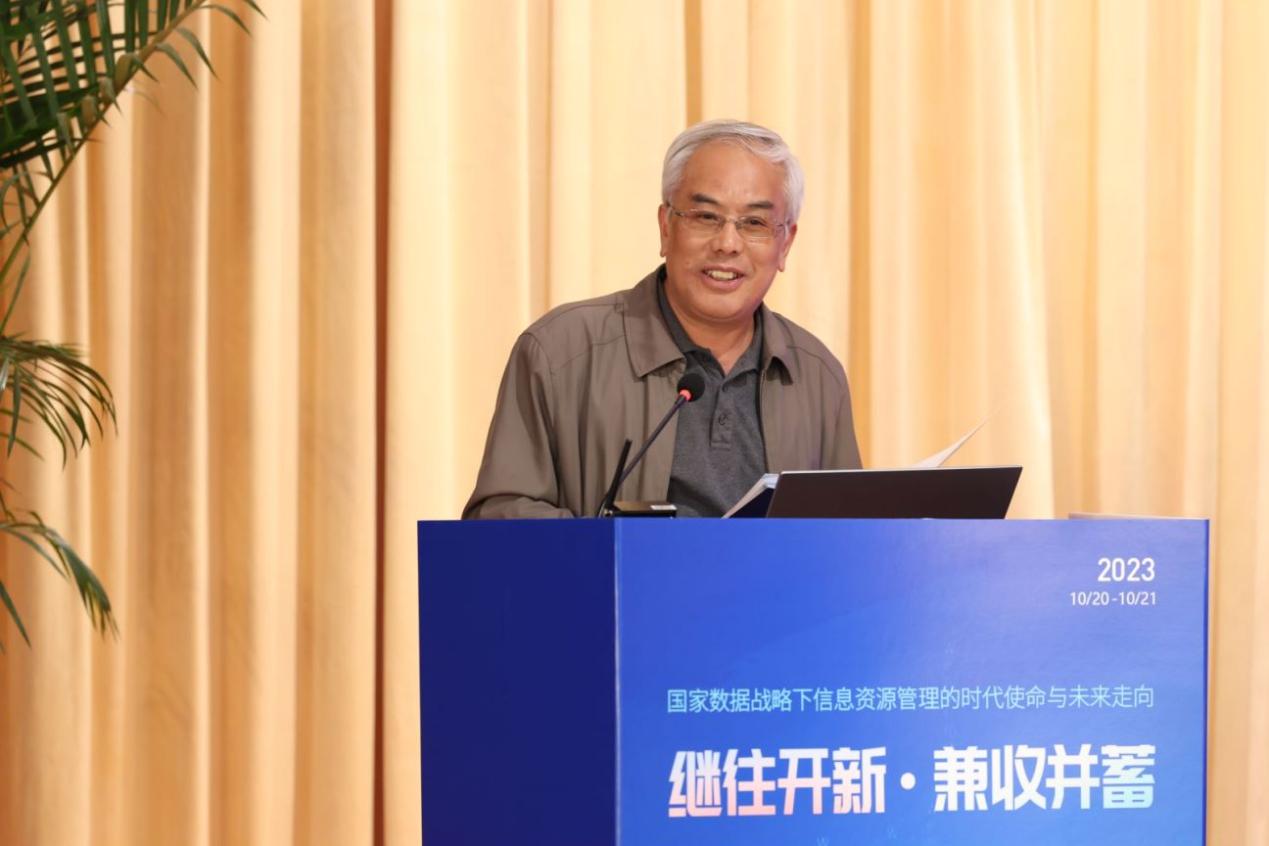
Prof. Ping Ke from the Information Resources Management Department at Nankai University’s Business School delivered a keynote speech titled “Building a Public Cultural Management Theoretical System with Chinese Characteristics for the Construction of a Cultural Powerhouse.” He discussed the progress of China’s current public cultural management practices from various aspects, including the mission of the era, interdisciplinary fields, theoretical innovation, evaluation of public cultural services, and digitalization of public culture. He proposed the development of a public cultural management theoretical system with Chinese characteristics, focusing on public cultural policy management theory, strategic management theory, big data management theory, and public cultural governance theory. This system aims to serve the goal of building a cultural powerhouse.
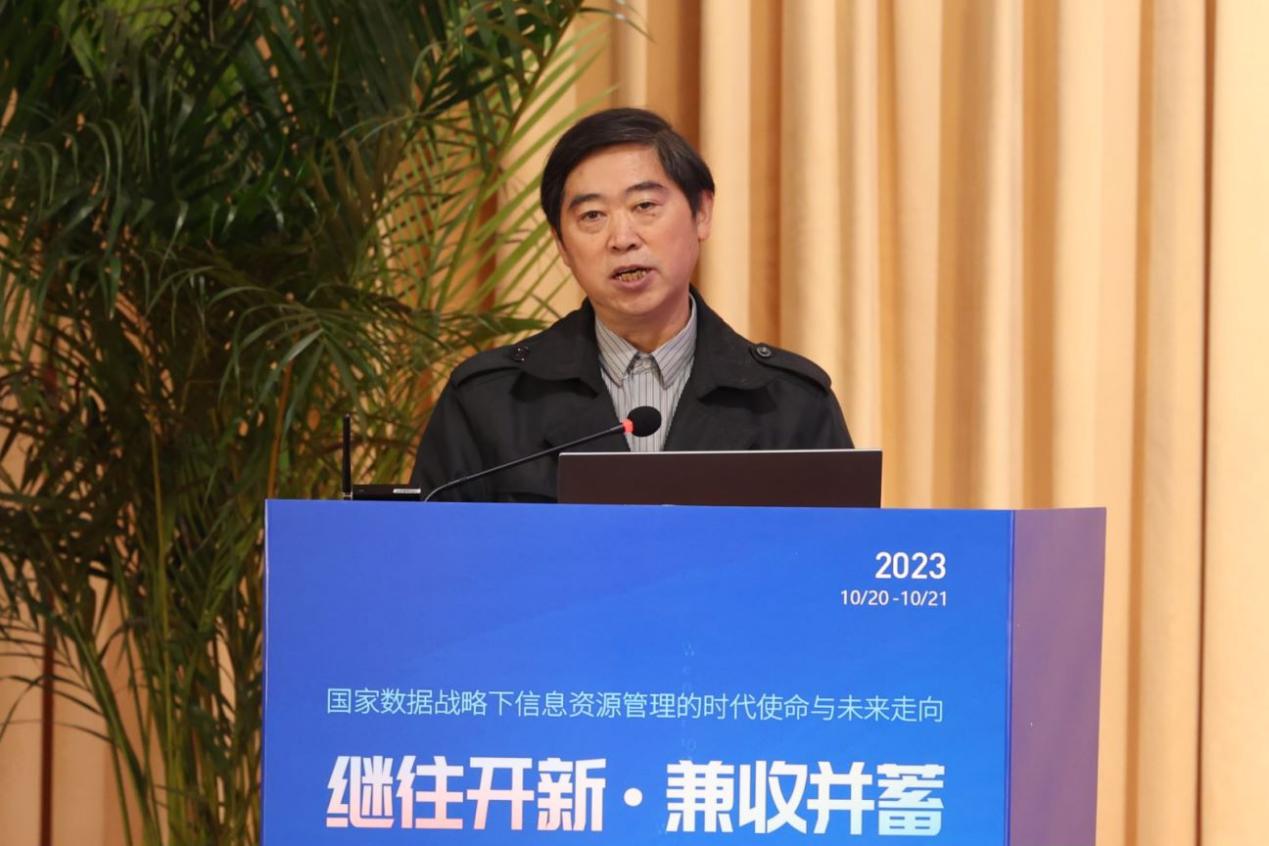
Professor Wang Yanfei, Director of the Academic Committee of the Department of Information Management at Peking University, delivered a keynote speech titled “Professional Wisdom in the Exploration of Intelligence Empowerment.” He addressed the fundamental issue in intelligence work, which is dealing with the incompleteness of information in the decision-making process. Intelligence empowerment, he argued, is at the core of intelligence work and research. He emphasized that constructing and accumulating intelligence facts based on perception and characterization will be an essential means to respond to security concerns. He introduced the technical lineage and academic cognitive lineage of intelligence in the context of empowerment response. Prof. Wang shared the latest developments in intelligence theory exploration, including topics such as Technology Intelligence Empowerment Theory and the capabilities of the national science and technology intelligence system.
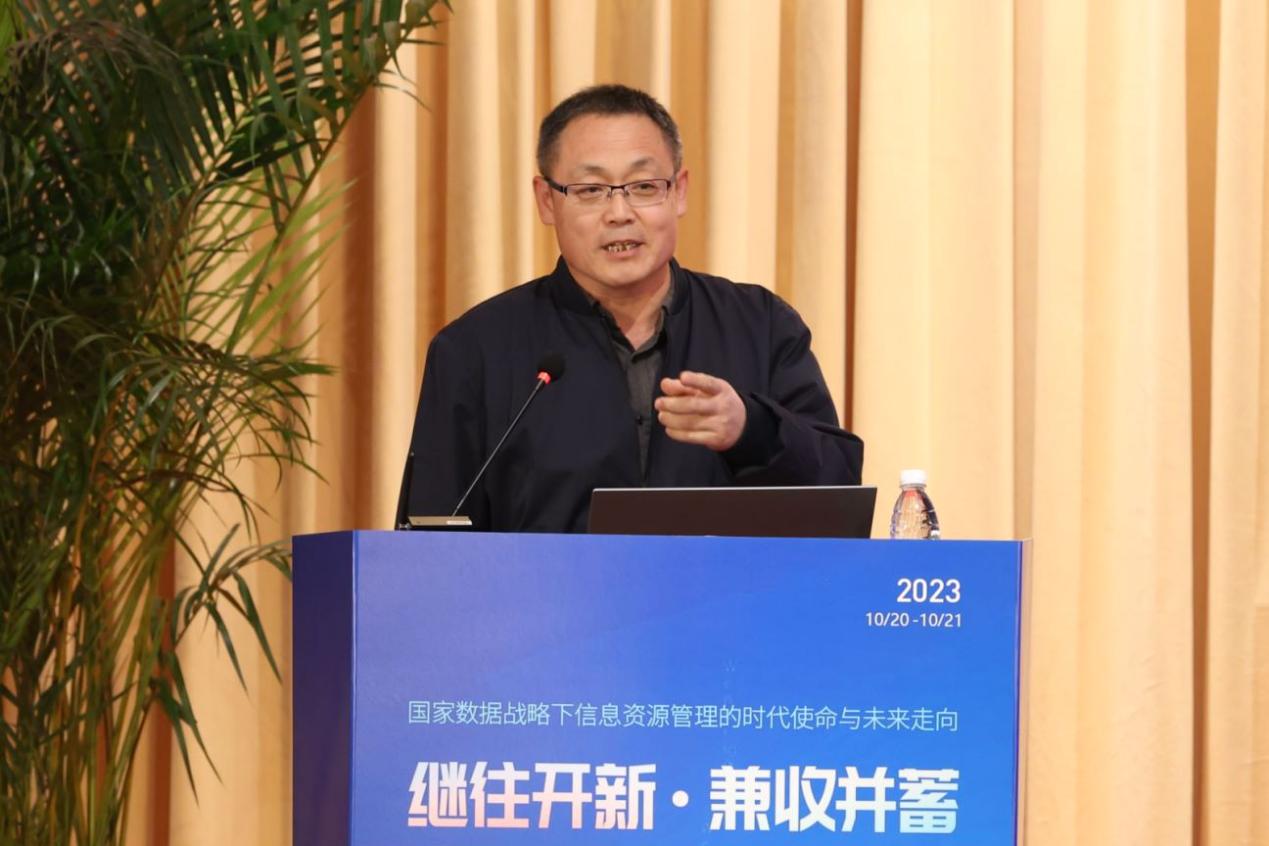
Prof. Bin Zhang, the Library Director of Renmin University of China and Secretary-General of the Eighth Information Resources Management Discipline Evaluation Group of the State Council, delivered a keynote speech titled “Mission and Pathways to Constructing China’s Autonomous Archival Knowledge System under the National Data Strategy.” He presented a detailed overview of constructing an autonomous archival knowledge system, focusing on four aspects: value, mission, foundation, and potential pathways.
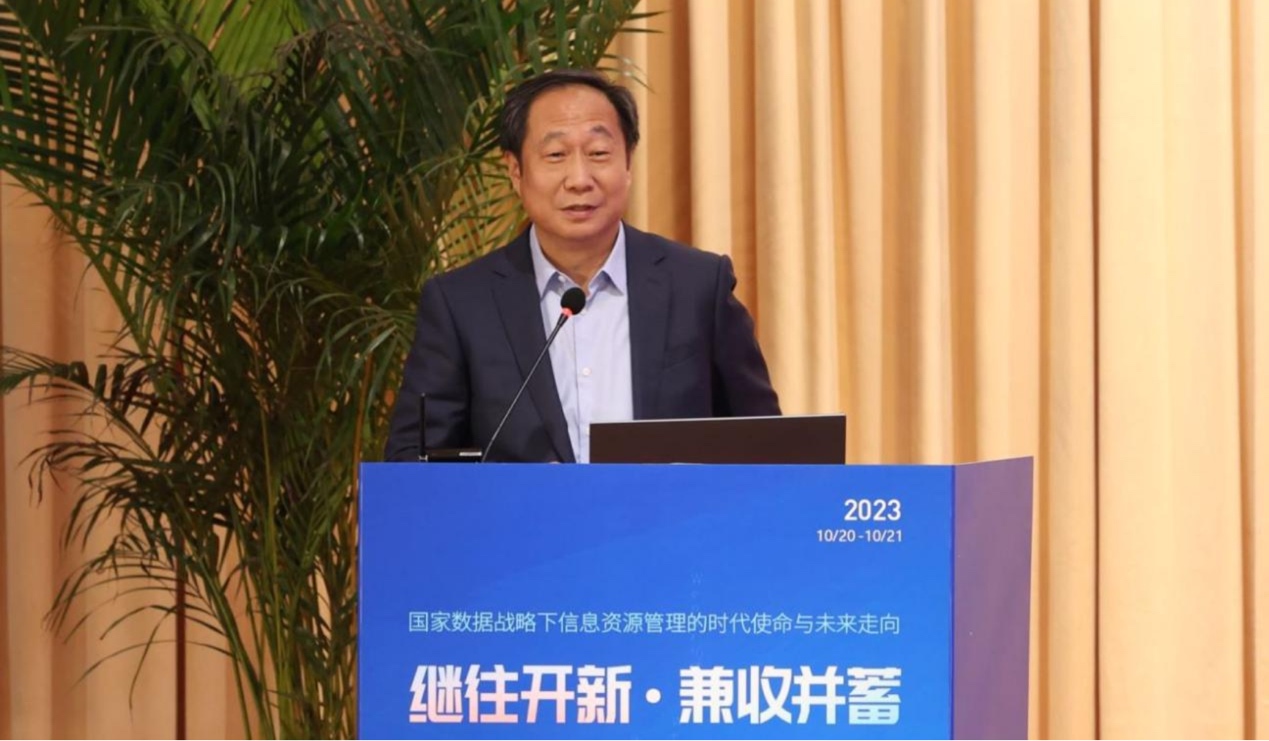
4. Premium Dialogues
On the afternoon of the 20th, two premium dialogues were held under the themes “Adherence and Transformation in Traditional Disciplines” and “Growth and Future of Emerging Disciplines”.
In the afternoon of the 20th, a premium dialogue was moderated by Shushi Wu, the Executive Deputy Editor-in-Chief of the Journal of Library Science in China, under the theme “Adherence and Transformation in Traditional Disciplines.” The participants included Prof. Huadong Ding, Party Secretary of the School of Cultural Heritage and Information Management at Shanghai University; Prof. Xiaoguang Wang, Associate Dean of the School of Information Management at Wuhan University; Prof. Yang Zhang, Dean of the School of Information Management at Sun Yat-sen University; Prof. Jiuzhen Zhang, Director of the Department of Information Management at Peking University; Prof. Yanhong Chen, from the School of Public Administration at Xiangtan University; Researcher Yajuan Zhao, Associate Director of the Information Resources Management Department at the School of Economics and Management, University of Chinese Academy of Sciences; Prof. Shuiqing Huang, leader of the Information Management Discipline at Nanjing Agricultural University; Prof. Gaohui Cao, Associate Dean of the School of Information Management at Huazhong Normal University; and Prof. Guoquan Zang, Dean of the School of Information Management at Zhengzhou University. The premium dialogue was divided into three segments: “Paying Tribute to Tradition”, “Facing Reality”, and “Returning to Rationality”. In the “Paying Tribute to Tradition” segment, Prof. Xiaoguang Wang discussed the support of theoretical framework research paradigms for the development of traditional disciplines. Dean Yang Zhang explained the ideological theories and methodological foundations facing the national data strategy from the perspective of information science, while Prof. Huadong Ding elaborated on the disciplinary and social values of archives studies oriented towards the national strategic archival discipline. In the “Facing Reality” segment, Prof. Jiuzhen Zhang proposed implementing disciplines in practice and illustrated this with examples from the development of library science and publishing professions at Peking University. Researcher Yajuan Zhao discussed the shortcomings of traditional disciplines in response to the national data strategy and emphasized the need for in-depth theoretical research and practical exploration. Prof. Yanhong Chen explored the issue of talent cultivation challenges, discussing target positioning, overall elements, curriculum system, faculty, and institutional safeguards. In the “Returning to Rationality” segment, Associate Dean Gaohui Cao pointed out the insufficient explanation of reality by existing theories and suggested integrating theories from other disciplines to deepen and expand research. Dean Guoquan Zang emphasized the need to adhere to the disciplinary attributes, maintaining the independence and autonomous knowledge system of the discipline. Prof. Shuiqing Huang emphasized the importance of focusing on the disciplinary discourse system. Subsequently, there was a lively discussion among the attendees on related issues during the interactive session.
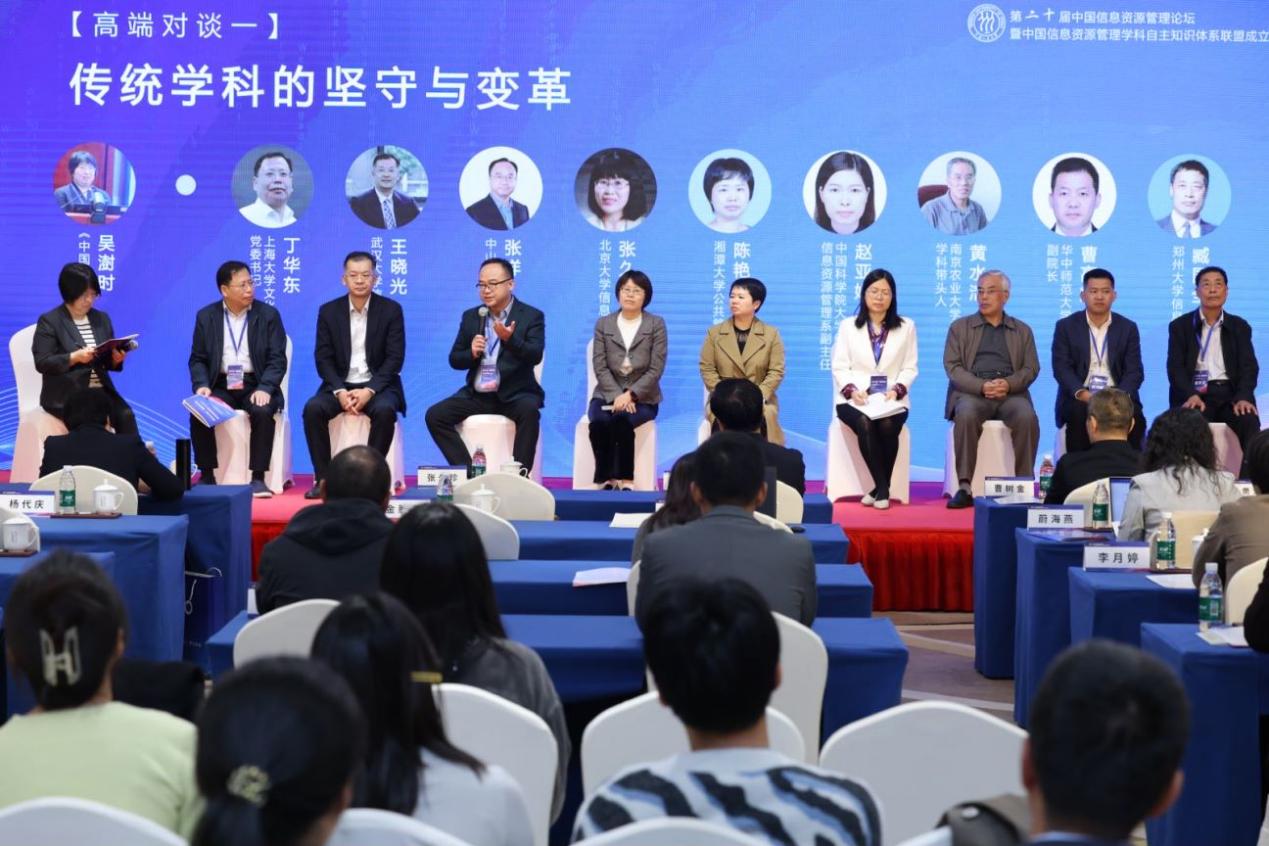
In the dialogue session “Growth and Future of Emerging Disciplines,” hosted by Daiqing Yang, Deputy Director of the Scientific Evaluation and Measurement Research Center at the Institute of Scientific and Technical Information of China, the following participants were present: Prof. Jie Ma, Associate Dean of the School of Business and Management at Jilin University; Prof. Yuenan Liu, Dean of the School of Information Resource Management at Renmin University of China; Prof. Yuelin Li, Director of the Department of Educational Affairs and Director of the Information Resources Management Department at the Business School at Nankai University; Prof. Shengyong Jin, Director of the Center for Educational Quality Assessment and Teacher Development at Hebei University; Prof. Li Yuan, Associate Dean of the School of Public Administration at Sichuan University; Prof. Haiyan Wei, Director of the Department of Information Management at the School of Business Administration at East China Normal University; Prof. Lei Pei, Dean of the School of Information Management at Nanjing University; and Prof. Kuangyong Xue, School of Political Science at the National Defense University. The dialogue was structured into three segments: “Facing the Unknown,” “Facing Competition,” and “Facing the Future.” In the “Facing the Unknown” segment, Prof. Yuelin Li shared Nankai University’s experiences and plans in responding to major national strategic construction projects. Dean Yuenan Liu introduced Renmin University of China’s experiences and recommendations for developing emerging disciplines, and Prof. Lei Pei shared Nanjing University’s strategic thinking on the development of the emerging interdisciplinary field of national security data management. In the “Facing Competition” segment, Prof. Jie Ma shared Jilin University’s experiences and lessons learned in developing emerging disciplines amidst competition, while Prof. Kuangyong Xue discussed how to integrate traditional disciplines into the development of military-related fields. In the “Facing the Future” segment, Director Shengyong Jin presented the historical development and future plans of Hebei University in the field of librarianship. Associate Dean Yuan Li discussed the interdisciplinary integration between the information resources management discipline and public administration at Sichuan University, and Director Haiyan Wei introduced the historical development and future plans of East China Normal University in areas such as public culture, business analysis, and scientific data management.
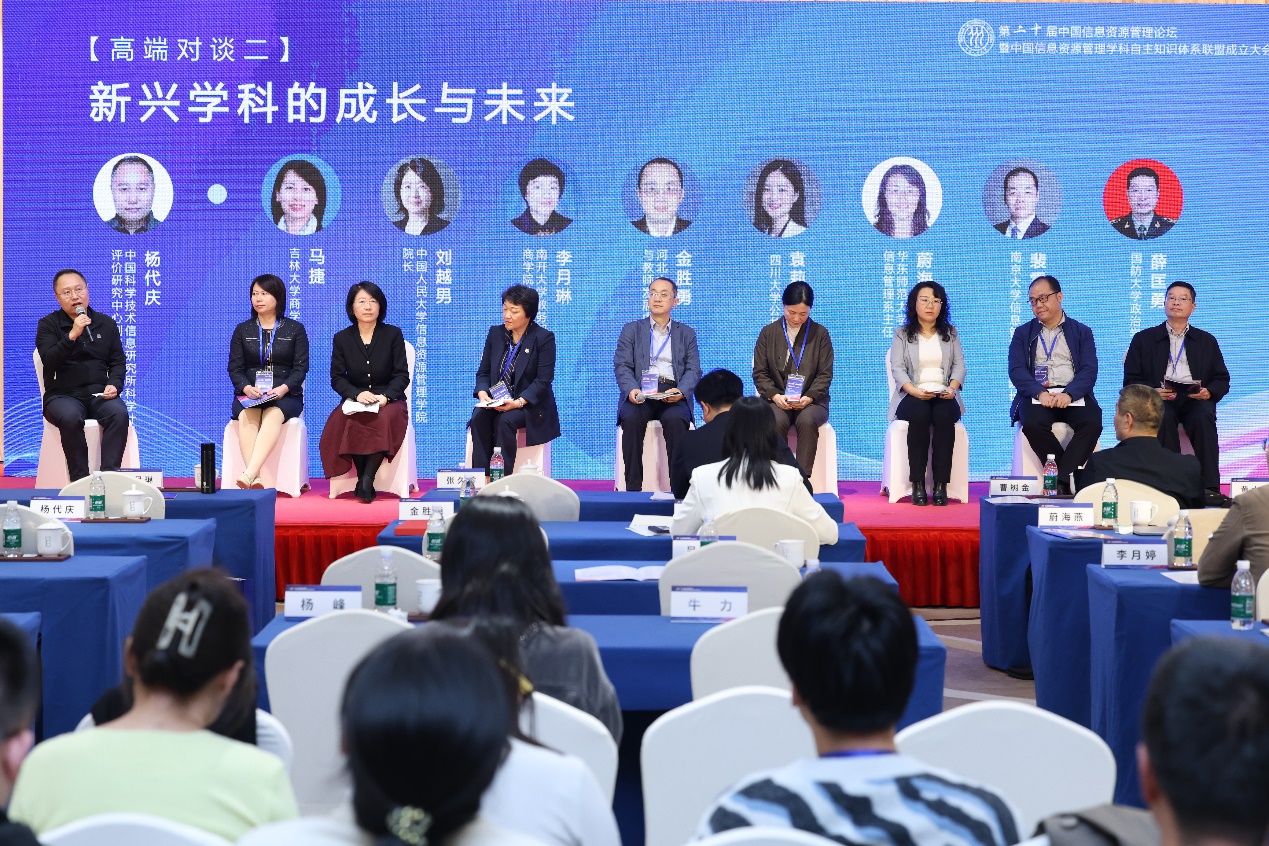
In the concluding session of the conference, Prof. Hui Yan, Associate Dean of the School of Information Resource Management at Renmin University of China, moderated the summary of the keynote speeches and premium dialogues. Research Librarian Shushi Wu and Deputy Director Daiqing Yang provided summaries for each group. Prof. Xiaobin Lu, Director of the Academic Committee of the School of Information Resource Management at Renmin University of China, offered an overall summary of the keynote speeches and premium dialogues. He reviewed the development journey of information resources management from its conceptualization to becoming an academic discipline and looked forward to a promising future for the information resources management discipline.




5. Academic Salon
On October 21st, the conference hosted four sub-forums, including the Autonomous Knowledge System Alliance Sub-forum and the “Renmin University Information Management · Seeking Truth Lecture” Academic Salon.
1.Sub-forum One
The sub-forum on “China’s Digital Humanities Development and Reflections under the Empowerment of Artificial Intelligence” was convened by Prof. Li Niu, Associate Dean of the School of Information Resource Management at Renmin University of China. Prof. Jihong Liang, Director of the Digital Humanities Department at the School of Information Resource Management, presided over the sub-forum. Prof. Yuenan Liu, Dean of the School of Information Resource Management at Renmin University of China, attended the event. The invited guests included Shengping Xia, Deputy Director of the Dunhuang Studies Dunhuang Information Center at the Dunhuang Academy; Prof. Weidong Zhang from the School of Business and Management at Jilin University; Prof. Linxing Zhou, Director of the School of Cultural Heritage and Information Management at Shanghai University; Assoc. Prof. Tao Chen from the National Cultural Heritage and Cultural Development Research Institute at Sun Yat-sen University; Prof. Jun Wang, Director of the Digital Humanities Research Center at Peking University; and Prof. Junzhi Jia from the School of Information Resource Management at Renmin University of China.
Prof. Jihong Liang introduced the experts and their respective topics. Shengping Xia shared the current status of the Digital Dunhuang project, the application of digital technologies in the protection of cultural heritage, and the digital return of Dunhuang cultural relics lost overseas. Prof. Weidong Zhang reviewed the development history of large language models, focusing on their applications and future trends in cultural production, cultural consumption, and cultural heritage fields. Prof. Linxing Zhou shared examples from her own experience, emphasizing the important role of digital humanities in the transformation of archival value recognition. Assoc. Prof. Tao Chen introduced AIGC and multimodal AI, proposing the concept of the N-ary multimodal data knowledge unified representation model for cultural heritage. Prof. Jun Wang discussed the current status and development trends of intelligent bibliography in the era of large models, showcasing the team’s diverse bibliography development tools and output platforms. Prof. Junzhi Jia introduced ethical risks in knowledge organization in the field of digital humanities, covering risk identification, causal analysis, and risk avoidance strategies. Prof. Li Niu provided a concluding statement for this sub-forum.
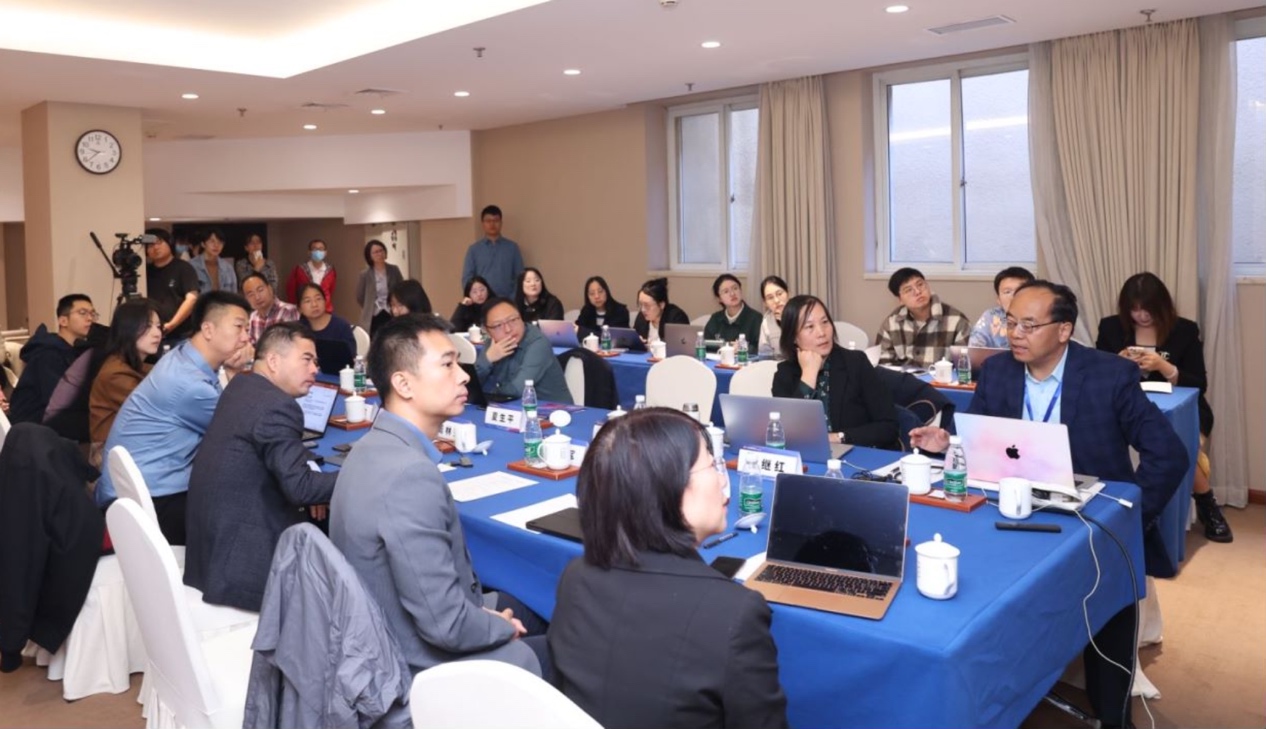
2.Sub-forum Two
The sub-forum on “Digital Equity in the Algorithmic Era” was convened by Prof. Hui Yan, Associate Dean of the School of Information Resource Management at Renmin University of China. It was chaired by Prof. Kun Huang from the School of Government at Beijing Normal University, Prof. Zeqian Chen from the School of Management at Hebei University, and Assoc. Prof. Xiaoning Sun, Vice Dean of the School of Information at Shanxi University of Finance and Economics. The invited guests included Prof. Dan Wu, Dean of the Undergraduate College at the School of Information Management at Wuhan University; Prof. Jing Zhang from the School of Information Management at Sun Yat-sen University; Prof. Yuxiang Zhao from the School of Information Management at Nanjing University; Prof. Ping Wang, Director of the Library Science Department at the School of Information Management at Zhengzhou University; Prof. Sufang Wang from the School of Public Administration at Zhejiang University; Prof. Wenjie Zhou from the School of Information Resource Management at Renmin University of China; Assoc. Prof. Zhenjia Fan, Deputy Director of the Library at Nankai University, and Prof. Feng Yang from the School of Public Administration at Sichuan University.
Prof. Kun Huang, Zeqian Chen, and Xiaoning Sun introduced each of the guest speakers. In the section on “Algorithmic Literacy in the Algorithmic Era,” Prof. Dan Wu discussed gender bias brought by AI algorithms. He conducted two empirical studies on online shopping platforms, calling for the promotion of digital equality in the AI algorithmic era to avoid new digital divides and address gender bias issues. Prof. Jing Zhang explored the variations in rights in the current digital era derived from the “Rights Document” of modernizing national governance, analyzing the forms and logic of library rights, and pointing out the opportunities for libraries. Prof. Yuxiang Zhao discussed the pros and cons brought by the algorithmic era for citizens and reviewed the research progress on algorithmic literacy in China and abroad. He presented empirical studies on the TikTok and Kwai video platforms, identifying the mechanisms and influencing factors of algorithmic literacy formation.
In the section on “Social Impact of AGI,” Prof. Ping Wang discussed the suitability of parents’ disclosure behavior of children’s privacy on online platforms. She emphasized finding a balance between children’s privacy protection and parents’ behavior of sharing their children’s photos online, calling for online platforms to take more responsibility for protecting children’s privacy. Prof. Sufang Wang detailed the analysis of the behavior characteristics of online bullying groups on domestic social media using user profiling and LDA topic modeling methods. She discussed the specific types of online bullying and the automatic detection of online bullying groups and types using traditional machine learning algorithms.
In the section on “Intelligent Technologies and Information Poverty,” Prof. Wenjie Zhou discussed the real problem behind the theory of effective functional market failure and pointed out that the true issue lies in the theoretical poverty. He argued that the main battlefield for economic and social development should be in the field of information resource management. Associate Prof. Zhenjia Fan extended the discussion to the background of information rights, conducting a systematic literature review to explore the information rights of minors, the constraints, and the safeguarding paths. Prof. Feng Yang provided a detailed analysis of the intelligent divide in the algorithmic era. He presented three core viewpoints: artificial intelligence centrifugal force accelerates the speed of intelligent divide formation, artificial intelligence penetration deepens the degree of intelligent divide formation, and artificial intelligence expansion increases the span of intelligent divide formation.
The discussion and Q&A session were moderated by Prof. Kun Huang, Prof. Zeqian Chen, and Prof. Xiaoning Sun.

3.Sub-forum Three
The sub-forum on “Key Technologies for the Protection and Restoration of Precious Literary Heritage” was convened by Prof. Meifang Zhang from the School of Information Resource Management at Renmin University of China. The session was co-hosted by Assistant Prof. Bing Li from the same institution and Research Librarian Honglu Sun from Shandong Provincial Archives. The invited guests included Prof. Yuhu Li from the Ministry of Education Engineering Research Center for the Protection of Historical and Cultural Heritage at Shaanxi Normal University, Associate Research Librarian Xiaomin Liu from the former Central Archives, Associate Research Librarian Hui Song from the National Library, Researcher Shan Wang from the Chinese Academy of Cultural Heritage, Zhou Xing, Chief of the Restoration Section at the First Historical Archives of China, doctoral students Yaya Wang and Chen Yu from the School of Information Resource Management at Renmin University of China, and doctoral student Xiaodong Lian from the School of Science at Renmin University of China.
Research Librarian Sun Honglu introduced each of the guest speakers. Prof. Yuhu Li shared case studies of salvage repair and protection of aging and decaying documents in different preservation states. Associate Research Librarian Xiaomin Liu introduced the manual restoration process, key technologies, and challenges of 35 small golden plaques that were brittle and faded. Associate Research Librarian Hui Song shared the restoration and protection work on Dunhuang manuscripts, presenting the original historical and cultural information and value of the Dunhuang manuscripts effectively. Researcher Shan Wang discussed the application methods and effects of the principle of minimal intervention in the restoration of Tibetan paper artifacts.
In the second half of the meeting, Zhou Xing showcased the results of the salvage repair of Ming and Qing Dynasty archives in a historical museum. He summarized representative key restoration technologies. Yaya Wang, a doctoral student, introduced the restoration method system developed by the project team for the complex and diverse preservation status of documents from the Western Regions, innovatively designing a protection method based on both preservation and utilization. Chen Yu, another doctoral student, emphasized the necessity of understanding the relationship between materials and long-term preservation, providing a scientific basis and useful references for the physical restoration of papyrus manuscripts. Xiaodong Lian, also a doctoral student, presented new technologies for glue removal and deacidification based on chemical materials and techniques, promoting innovation in cultural heritage protection. Honglu Sun, the Research Librarian, moderated the discussion and Q&A session.
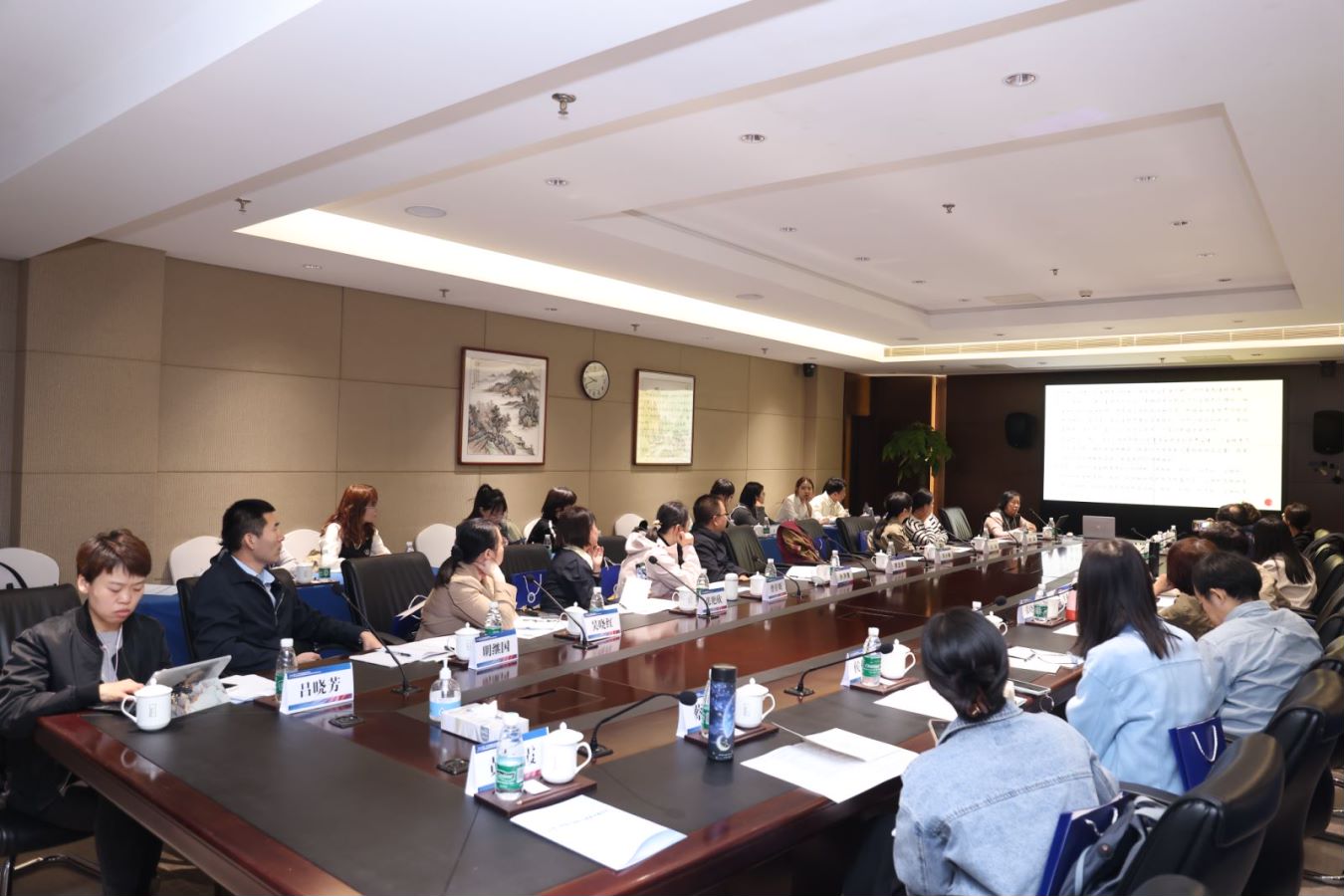
4.Sub-forum Four
The sub-forum on “Quantitative Analysis of the Interaction between Policy and Science” was convened by Prof. Menghui Yang from the School of Information Resource Management at Renmin University of China. The session was hosted by Prof. Ming Ren from the same institution. The invited guests included Prof. Lu An from the School of Information Management at Wuhan University, Prof. Liang Ma from the School of Public Administration at Renmin University of China, Assoc. Prof. Chaoguang Huo from the School of Information Resource Management at Renmin University of China, and Euan Adie, the founder and CEO of the large-scale policy database Overton.
Assoc. Prof. Ming Ren introduced each of the guest speakers. Prof. Menghui Yang shared research findings on policy-cited papers from the perspective of citation analysis, including the characteristics and distribution of policy-cited papers, analysis of influencing factors, recommendation of scientific evidence based on knowledge graph, and cross-disciplinary dissemination characteristics from science to policy. Prof. Lu An discussed three relationships between policy and science driven by data intelligence: policy influencing science, science influencing policy, and the co-evolution of policy and science. Prof. Liang Ma introduced research on policy impact using Altmetric data in the field of public administration, and engaged in an in-depth discussion on this topic. Assoc. Prof. Chaoguang Huo introduced the emerging research field of policy informatics from the development process, connotation, and research dimensions, and proposed exploring the future research of policy informatics from the perspectives of developing new tools and exploring new models. Euan Adie provided detailed information about the coverage, distribution, and characteristics of policy-cited data in the Overton database, offering essential data support for the quantitative analysis of the interaction between policy and science. Assoc. Prof. Ming Ren moderated the discussion and Q&A session.
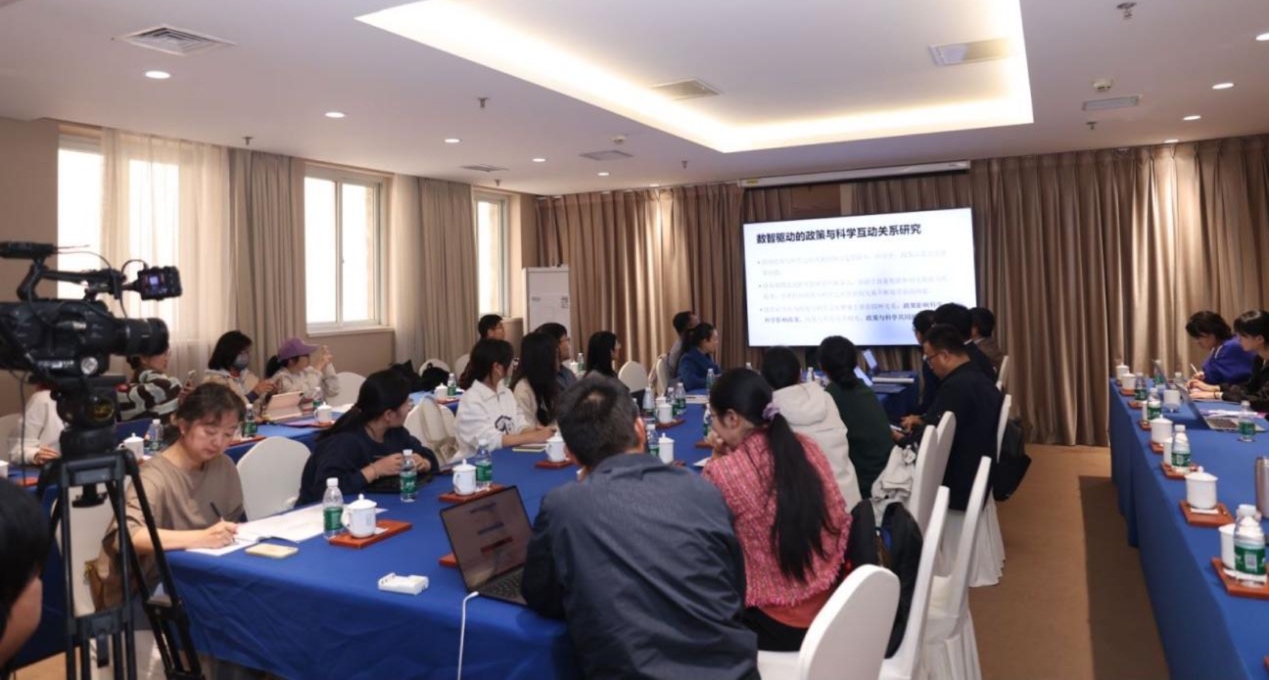
The forum received support from journals such as Journal of Library Science in China, Journal of Information Science, Archives and Library Work, Library and Information Service, Information Studies: Theory & Application, National Library Science, Library Construction, Library Theory and Practice, Journal of Library and Information Sciences in Agriculture, and Journal of Sichuan University (Philosophy and Social Science Edition).

Authorship: Chunming Pan, Danhua Dong, Chao Ren, Yinghui Chu, Yu Cheng
Review: Guancan Yang, Zhenyuan Zhu
- Faculty from the School of Information Resource Management attended 2023 Annual Meeting of the International Electrotechnical Commission’s Smart City System Committee
- Faculty and Students of the School of Information Resources Management participate in the 2023 ICA International Congress on Archives
- The 20th China Information Resources Management Forum and the Inaugural Meeting of the Autonomous Knowledge System Alliance for Information Resources Management Discipline in China were successfully held
- The international publication of papers from the School of Information Resource Management (SIRM) at Renmin University of China, by teachers and students since June 2022
- Vice President WANG Yi visited the School of Information Resource Management for investigation
- Dr. Liang Jihong Lectured Online in Special Training Camp Series of Digital Memory
- Symposium on Community Informatics (CI) in Digital China was held by SIRM
- Associate Professor Rony Medaglia from Copenhagen Business School Gave A Cutting Edge Lecture: Digital Transformation in Government
- The International Frontier Teachers’ Lecture on the Theory, Principles and Methodology of ISO Terminology Standard Formulation was held successfully
- The 2019 Working Conference of Research Center for Humanistic Beijing was successfully held


